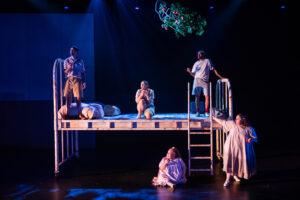Wharf 1 Theatre, June 11
8/10
Little children suffer terror with minimal provocation. Dreams, sounds and shadows on the wall will do it, let alone hospitals, war and abduction. Alongside tidal waves of grief, families ripped asunder, all sense of home and belonging annulled and lives devastated beyond salvage, the saga of the Stolen Generations is also one of sheer terror. Ian Michael’s Sydney Theatre Company production of Janes Harrison’s pivotal 1998 play has the power to trigger this sensation.

We’ve grown used to terror – whether in film, fiction or plays – being allied to Gothic horror, but what Michael gives us is more deeply affecting. It has no thrill factor. Renee Mulder’s set is primarily defined by a giant bed and filing cabinet. Where Harrison’s text called for “five old iron institutional beds”, Mulder gives us just this one, seen from a toddler’s perspective: monstrous, formidable and as cosy as scaffolding. The hulking filing cabinet’s drawers, meanwhile, which lock away forever the secrets of birth, name, family and home, open to become a stairway to nowhere: the destination of too many First Nations lives under this institutionalised “kindness”.
Amplifying the impact is James Brown’s underscore: sparse, whispered sounds that never venture anywhere near the borders of melodrama. Then there are the gigantic, looming, cheerless puppets used to represent the whites who take in the children, with their mouths hissing platitudes to bolster their indefatigable self-righteousness.

The inspiration for this disquieting theatrical ingenuity is all there in Harrison’s vastly imaginative text, with its chronological leaps between the characters’ childhood and adult lives, which, as well as showing cause and effect, serve to magnify the pervading bewilderment and alienation we share.
Her “case studies” are brilliantly vivid. There’s Jimmy (Jarron Andy), who has a penchant for embroiling himself in trouble, and is sceptical of his one chance to be reunited with his mother. Mischief becomes trouble with the law, and the outcome is a statistical abomination. Sandy (Mathew Cooper) is the wise one; the one with a sense of connection if only he can find the right place with which to connect. Ruby (Kartanya Maynard) is brought to the children’s home far too young, and subsequently discovers worse inhumanity too young as well.

Anne (Stephanie Somerville), the palest in skin colour, is more amenable to the life offered by her foster parents, but as she grows up, she finds herself too black for the whites and too white for the blacks. Finally, there’s Shirley (Megan Wilding), a stolen child who become the mother of stolen children, but who at least can bathe away some of her sorrows in the joys of being a grandmother.
STC has so often exploited Wilding’s gift for comedy that it’s fascinating to see her in a dramatic role encumbered with such tragedy and rapture, and she emerges as the standout actor. Andy, Cooper, Maynard and Somerville come to convince and move us, too, but Wilding takes us deep into the world implied by the set, and makes us live the terror and the grief, where the others merely make us watch it.

Lighting designer Trent Suidgeest’s creation of shadows is at one with the staging and music, especially in Jimmy’s final scene. But that’s the triumph of Michael’s production: all elements are so thoroughly intertwined – even the use of Kevin Rudd’s National Apology to the Stolen Generations. Now if the other actors rise to Wilding’s level, this will become a distinguished production of an already momentous play.
Until July 6.